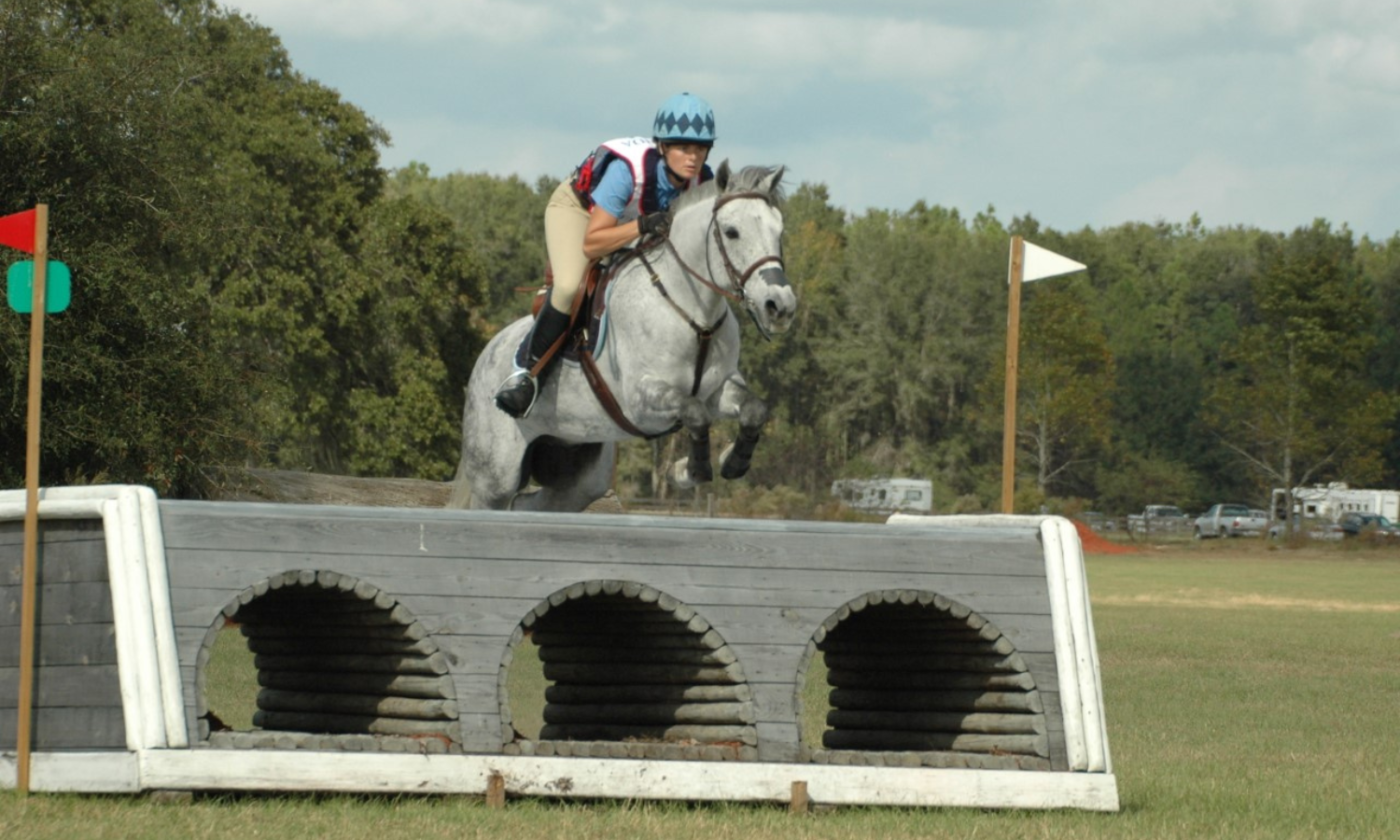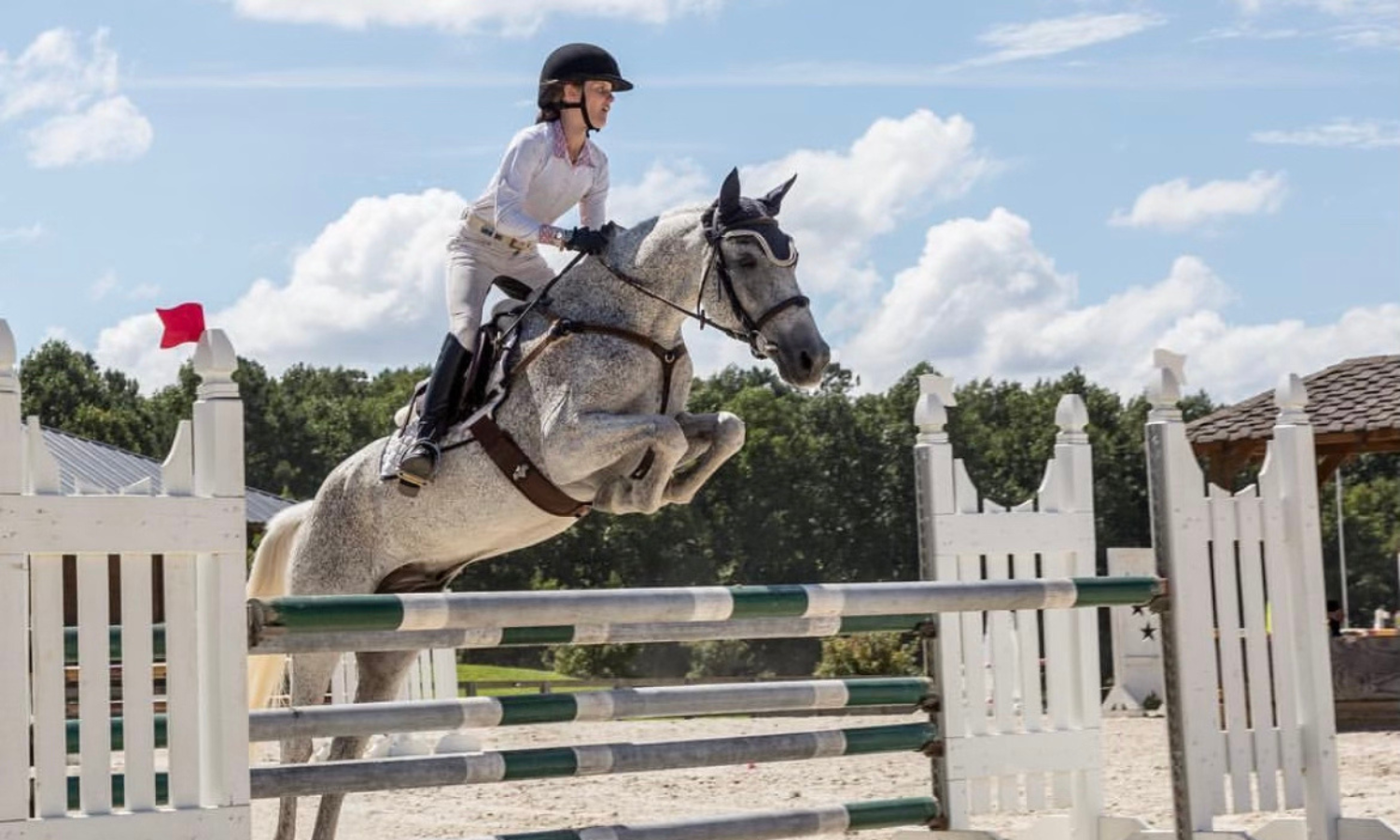

Horse shopping can sometimes feel like a box of chocolates. An unassuming choice might turn out to be the best of the bunch. For 39-year-old Betsy Ball, this was certainly the case with her heart-horse, West Point. Ball was originally in search of an all-around lesson horse for her barn; what she ended up getting was a barely broke 5-year-old who would go on to be her FEI two-star mount and inherently change her entire perspective of the sport.
21-year-old Quarter Horse Cross, West Point aka "Tucker" is a wonderful and patient horse that has made his way through over 100 Horse Trials over the course of 15 years. Their long journey began around 2007 when Ball was shopping for a new lesson horse for her program. Ideally, she was looking for a quiet and calm natured horse who could help out a few of her students. What she found when she went to try the then 5-year-old was anything but that. “I was looking for a lesson horse and my friend told me that a friend of hers had this horse for sale and it was little and cute and it had been trail ridden,” stated Ball.“I went to look at him, put the saddle on, and threw a kid on him and he humped his back up so big and so fast. I told the kid to bail and he took off bucking in my tack. He was obviously much less broke than I believed. Told the guy thanks, he’s a nice horse but isn’t going to work as a lesson horse.”
Just a week later, Ball’s working student, Sara Lauderdale, sold her horse and was in search of a new mount. With a clever idea in the back of her mind, Ball said: “I told her that if he could buck like that he could really jump, so she bought him.” Though, it did not take long for the seasoned professional eventer to realize that Tucker had something special about him and purchased him off of Lauderdale to take under her wing.
Having worked with young and green mounts before Tucker, Ball had the knowledge and skills to properly bring up a solid eventer, but the smart young Quarter Horse cross proved to be a tough nut to crack. “Gosh, he was a tricky one to train,” claimed Ball. “You sort of had to trick him into doing the flatwork. I put a lot of poles down to get him to go forward. He was born understanding the jumping, but the dressage was tricky.”
With the help of trainer and friend, Stephie Baer from Weston, Massachusetts, Tucker’s flatwork was slowly rising to match his natural jumping abilities and starting to peak Ball’s interest in developing and leasing him to help her students succeed. Having competed in the sport of eventing since she was a child, Ball always dreamed of competing in the big leagues with a flashy, fancy warmblood, though she noted, “As a kid my family couldn't have more than one horse at a time financially. Every time I outgrew a horse, we had to sell it. So, as an adult, I knew when I got my first FEI horse that I wanted to be able to keep it through retirement…”
“When I was a kid, I thought that the nice horses were the Advanced horses and the older I get, the more I realize the nice horses are the ones that make people enjoy horses and eventing. I think he is as nice of a horse as you will ever find,” stated Ball. The unbroke 5-year-old bucking Quarter horse cross she bought off of her working student turned out to be the best of the bunch, taking her to the CCI2* and always safely carrying her home. Ball reminisced, stating, “The feeling of being on him circling the start box in cross-country and knowing he was going to bring you home safely. That is the most incredible feeling.” Having not gotten a single cross-country fault since 2018, Tucker proved Ball wrong in that the best horses are not always the most expensive or flashy.

Based on his many riders, Tucker has proven to be a fantastic teacher. He has taken multiple riders up the ranks from Beginner Novice to Preliminary including many of Ball’s own students. Students like Stephanie Aanstoos (his first rider after Ball) and Allison Miner (his current rider) have experienced first-hand the patience Tucker has while carrying them through the levels. “He is still being leased right now by a student of mine, Allison Miner.” Ball explained. “She is running him at the Novice level right now, but I expect her to run him at the Training level this fall and see what the future holds. He will not run Preliminary anymore, but he is still having a great time and doing his job.”
Miner's love for Tucker runs deep. "Tucker has given me something no other horse has," she shared. "He gave me back my confidence and love for the sport. When I first leased him, I just had the goal of making it through an event - next thing I know, I’m going to the American Eventing Championship with him. He has taught me patience, and most importantly, perseverance. This little horse always shows up to work, and loves his job. He has given me so much in the two years I have leased him, and I couldn’t ask for a better partner.
Tucker’s hard work has not gone unseen. Many have noticed his sweet nature and strong work ethic and wanted to test it out for themselves. “I have had people offer me money for him that would have changed my life,” stated Ball. “But having him has changed my life.” The FEI horse Ball always dreamed of loving and doting on through their whole career and into retirement ended up being the least-likely suspect.
Tucker seems to thoroughly enjoy eventing and according to Ball, he’s never happier than when he is out doing cross country. “I think he loves the sport more than I do. This horse I cannot even tell you the feeling to be on him circling the start box in cross country and knowing he was going to bring you home safe. That is the most incredible feeling. He had I believe a 100% completion record in cross-country. Every time he has left the start box he has come home.” Another interesting note is that by most standards, Tucker did not "pass" his pre-purchase exam when he came into Ball's life. Despite the notes on the PPE, he went on to be one of the soundest horses in Ball's barn. "I feel like that can give some perspective on vettings these days," Ball added.
We all wish our animal companions could understand us at times. There is so much we could tell them. When Ball was asked what she would say to Tucker, she replied, “First of all, that horse is so smart I think he does know what I am saying. I give him a cookie every day and I tell him thank you. He has made my career and made my life and made a whole lot of people love the sport of eventing. You couldn't ask for anyone to be any more generous than that.”
Since the very beginning, Tucker has done more than just win ribbons and impart valuable lessons to his many riders. He and he alone showed Ball what the sport was really about and made her fall in love with horses all over again. Tucker has the unique and highly-sought after ability to take some of the stress of competing away with his calm, genuine demeanor. His attitude creates a safe space for new and seasoned riders alike. Some think that in order to be successful in eventing, they need the fanciest and most expensive. But in reality, all one needs is a horse to be patient and wait for their hidden gem to fall in their lap.
The United States Eventing Association, Inc. (USEA) is proud to announce the first class of USEA Young Event Horse (YEH) Judges have completed their certifications through the YEH New Judge Education Program, which was led by YEH faculty member, Marilyn Payne.
Nazila Hejazi and her 20-year-old Missouri Fox Trotter mare, Tessa, may have made for an unconventional pair at the USEA Area VI Championships, held in October at Galway Downs (Temecula, California) but they didn’t let that hold them back. It’s uncommon to see a horse in their twenties still competing in eventing, and even more rare for a gaited horse to compete in a jumping sport.
Today, we pause to honor the legacy of Dr. Martin Luther King Jr. and reflect on the powerful moment in 1963 when he stood on the steps of the Lincoln Memorial and shared his vision for a better future. Dr. King's "I Have a Dream" speech was more than just words; it was a call to action that transcended time, culture, and boundaries—a beacon of hope that continues to inspire.
We’ve all been there—on the horse who pokes his way around the warm-up ring, needs leg, leg, leg coming into the combination, or brings up the rear on every trail ride. None of us wants each and every ride to be a lower-body squeezefest, nor do we wish to do anything with our crop except maybe wave it at that annoying deerfly. In this excerpt from his book The Sport Horse Problem Solver, former international eventer Eric Smiley explains the essential quality of forwardness and how to prepare the horse to expect you to look for it in all that you do together.